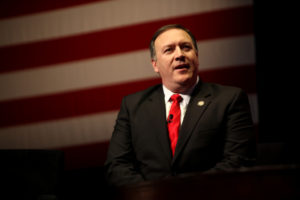Newly Nominated Secretary of State is a Holy Crusader
 Mike Pompeo (Photo by Gage Skidmore)
Mike Pompeo (Photo by Gage Skidmore) Soon after Rex Tillerson was fired as Secretary of State, Donald Trump named his probable successor (pending confirmation) as the United States’ head diplomat: current director of the Central Intelligence Agency (CIA) and former Republican member of Congress from Kansas, Mike Pompeo. It’s a concerning choice, considering that his extremely evangelical Christian views are well documented and will affect not only his foreign policy positions but also impact the hiring practices he imposes.
On the foreign policy front, Pompeo has expressed views about Islam and Muslim-majority countries that many find Islamophobic. In a speech given when he was in the US House of Representatives, he famously said that Islamic terrorists would “continue to press against us until we make sure that we pray and stand and fight and make sure that we know that Jesus Christ is our savior is truly the only solution for our world.” (If you find that sentence hard to understand you’re not alone.) He has also described wars the US is engaged in as “between the Christian West and the Islamic East.”
After the Boston Marathon bombing in 2013, despite the fact that multiple Muslim leaders condemned the attack, Pompeo claimed, “But the silence in the face of extremism coming from the best-funded Islamic advocacy organizations and many mosques across America is absolutely deafening. It casts doubt upon the commitment to peace by adherents of the Muslim faith.” He called the leaders “potentially complicit” in the attack.
As a member of congress, Pompeo attended a bible study group whose study guide proclaims, “NOT EVERY MUSLIM IS A TERRORIST BUT EVERY INTERNATIONAL TERRORIST IN RECENT HISTORY HAS BEEN A MUSLIM.” [Emphasis theirs.]
Leaders of the Muslim-majority countries that Pompeo would deal with as secretary of state could be forgiven for finding such sentiments alarming.
American Muslim activists and scholars have condemned the appointment. “It is not a good thing when the public face of American diplomacy holds views which demean an entire religion,” said Shadi Hamid, a fellow at the Brookings Institution.
Scott Simpson of the legal advocacy group Muslim Advocates agrees. “This announcement should concern every Congress member and American who values religious freedom,” he warns. “This [is] not a man who can be trusted in the cabinet, and we urge members of the Senate to speak up against this announcement.”
And foreign policy, while certainly the main focus of the US Department of State, isn’t the only area in which Pompeo’s conservative Christian views might have an impact. At the CIA, his religious beliefs have directly impacted the workforce. Foreign Policy magazine reports that employee diversity was adversely affected when Pompeo took the helm. For example, the man who once said, “America had worshipped other Gods and called it multiculturalism. We’d endorsed perversion and called it an alternative lifestyle”—has shown a distinct lack of interest in hiring LGBTQ employees. He chose not to attend the intelligence community’s Pride Summit and cancelled all CIA Pride events. CIA outreach activities to minority communities and women have also suffered under his leadership.
According to the Foreign Policy article entitled “More White, More Male, More Jesus,” CIA employees expressed concern about the diminished focus on diversity. “For those who have worked inside the agency, the backtracking on diversity represents a threat to the workforce and national security….The agency needs employees from different backgrounds and orientations to effectively recruit agents abroad.”
At the CIA, Pompeo openly emphasized his Christianity. In addresses to CIA employees, as well as in reports, he apparently made repeated religious references. The Military Religious Freedom Foundation, which counts members of the intelligence community among its members, reports a rise in complaints from inside the CIA.
It’s hard to imagine this man leading our country’s foreign policy efforts—especially in areas where diplomacy is crucial. Say, for instance, in the Middle East.
